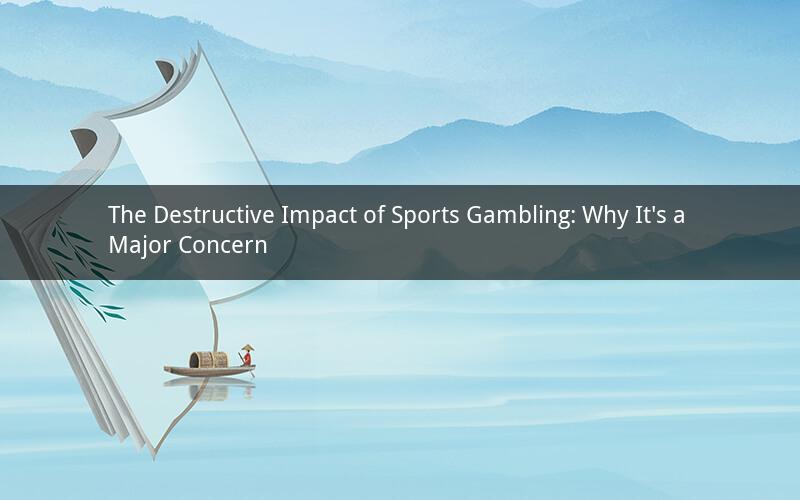
Sports gambling has become an increasingly popular activity in recent years, captivating millions of individuals worldwide. While it may seem like a harmless way to enjoy sports and potentially earn some extra money, the reality is that sports gambling can have devastating consequences. This article delves into the reasons why sports gambling is considered bad and highlights the potential dangers it poses to individuals, families, and society as a whole.
1. Financial Risks
One of the primary reasons why sports gambling is considered bad is the significant financial risks involved. Many individuals who engage in sports gambling do so with the hope of winning big money. However, the odds are often stacked against them, and the chances of losing are much higher. This can lead to severe financial problems, including debt, bankruptcy, and even homelessness.
2. Addiction
Sports gambling can be highly addictive, as it triggers the release of dopamine in the brain, creating a sense of excitement and satisfaction. This can lead to compulsive gambling, where individuals feel the need to keep betting in order to experience the same level of excitement. Addiction to sports gambling can have severe consequences, including strained relationships, job loss, and a decline in overall well-being.
3. Emotional and Psychological Damage
The emotional and psychological impact of sports gambling can be just as damaging as the financial risks. Individuals who are addicted to sports gambling may experience feelings of guilt, shame, and despair when they lose. This can lead to depression, anxiety, and other mental health issues. Additionally, the stress and pressure associated with sports gambling can take a toll on relationships, causing strain and conflict.
4. Illegal Activities
Sports gambling is often associated with illegal activities, such as match-fixing and corruption. When individuals place bets on sports events, they may be unknowingly supporting illegal activities that can have far-reaching consequences. This not only undermines the integrity of sports but also poses a threat to the safety and well-being of athletes and fans.
5. Social and Economic Consequences
The social and economic consequences of sports gambling are significant. When individuals become addicted to sports gambling, they may neglect their responsibilities, such as work, family, and personal relationships. This can lead to a decline in productivity and a strain on social services. Moreover, the illegal activities associated with sports gambling can have a negative impact on the economy, as they drain resources and contribute to crime.
Frequently Asked Questions:
1. What are the legal implications of sports gambling?
Sports gambling is legal in some countries and regions, while it is illegal in others. It is essential to be aware of the laws and regulations in your area to avoid legal consequences.
2. How can I recognize a sports gambling addiction?
Signs of a sports gambling addiction include an inability to control betting behavior, lying about gambling activities, and neglecting responsibilities due to gambling.
3. What can I do if I or someone I know is struggling with a sports gambling addiction?
Seeking help from a professional therapist or counselor is crucial. Support groups and treatment programs are also available to assist individuals struggling with sports gambling addiction.
4. How can sports gambling be regulated to minimize its negative impact?
Regulation can involve implementing stricter laws, promoting responsible gambling practices, and providing education and resources to help individuals make informed decisions.
5. What are some alternative ways to enjoy sports without engaging in gambling?
Alternative ways to enjoy sports without gambling include attending games, watching them on television, participating in fantasy sports, and supporting local teams and athletes.
In conclusion, sports gambling is a major concern due to its potential to cause financial, emotional, and psychological damage. It is crucial to be aware of the risks associated with sports gambling and take steps to prevent addiction and illegal activities. By promoting responsible gambling practices and providing support to those in need, we can work towards a healthier and more sustainable sports gambling environment.